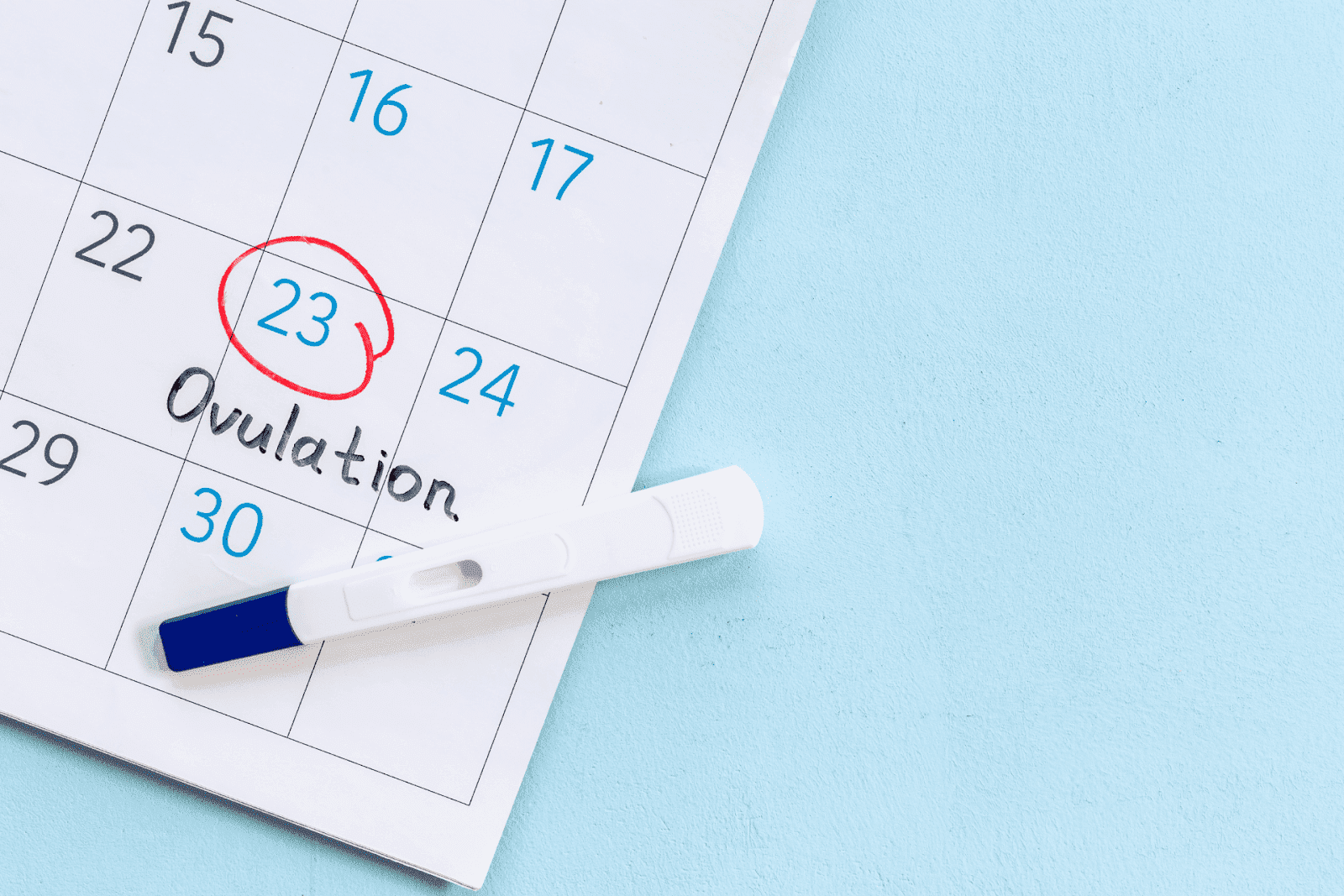How Long Will an Ovulation Test Stay Positive?
Understanding your ovulation cycle is a crucial step for anyone trying to conceive or simply wanting to track their reproductive health. Ovulation tests are a popular and [...]
Read More
Medically reviewed by Alan Lucks | MD, Alan Lucks MDPC Private Practice - New York on October 16th, 2025.
The luteinizing hormone (LH) surge occurs 24-48 hours before egg release, creating a positive test window that typically lasts 12-48 hours depending on individual hormone patterns.
Women with polycystic ovary syndrome (PCOS) may experience falsely elevated LH levels, leading to positive results that don't correspond to actual ovulation cycles.
Test sensitivity varies significantly between brands—some detect LH at 20 mIU/ml while others require 40 mIU/ml, affecting how long your surge appears positive.
Your most fertile window spans the 24-48 hours after the first positive result, as sperm can survive up to 5 days while eggs remain viable for only 12-24 hours post-ovulation.
Positive results lasting more than 3 consecutive days may indicate hormonal imbalances, perimenopause, or certain medications interfering with normal LH patterns.
Understanding your ovulation cycle is a crucial step for anyone trying to conceive or simply wanting to track their reproductive health. Ovulation tests are a popular and accessible tool that helps detect the fertile window by identifying the surge in luteinizing hormone (LH) that triggers ovulation. However, many people wonder how long an ovulation test stays positive. This article explores the science behind ovulation tests, what a positive result means, and how to interpret the timing to maximize your chances of conception.
Ovulation tests, also known as ovulation predictor kits (OPKs), detect the presence of LH in your urine. LH is a hormone that surges approximately 24 to 48 hours before ovulation, signaling that an egg is about to be released from the ovary. This surge is what ovulation tests are designed to detect.
Most ovulation tests come in the form of test strips or digital devices. When you take the test, you either dip the strip into a urine sample or hold the digital device in your urine stream. A positive result indicates that the LH surge is occurring, and ovulation is likely to happen soon. Many women find that using these tests provides a sense of empowerment and control over their reproductive health, allowing them to track their cycles with greater precision.
 Why Timing Matters
Why Timing MattersSince the LH surge precedes ovulation by about one to two days, identifying this surge accurately can help you pinpoint your most fertile days. This is especially important for couples trying to conceive, as timing intercourse during this fertile window increases the chances of pregnancy. Additionally, understanding your ovulation cycle can help in planning for other aspects of reproductive health, such as scheduling medical appointments or considering fertility treatments if necessary.
Moreover, ovulation tests can also serve as a valuable tool for women who are monitoring their menstrual cycles for various reasons, including managing conditions like polycystic ovary syndrome (PCOS) or irregular periods. By tracking ovulation, women can gain insights into their overall reproductive health, which can be beneficial for discussions with healthcare providers. Some women even use these tests in conjunction with basal body temperature charting or cervical mucus monitoring to create a comprehensive picture of their fertility, enhancing their ability to conceive or simply understand their bodies better.
The duration that an ovulation test stays positive varies from person to person, but generally, the LH surge lasts between 12 and 48 hours. This means that an ovulation test may show a positive result for one to two days during your cycle.
Some women experience a rapid surge where the test is positive for only a short period, sometimes less than 12 hours. Others may have a longer surge, with positive tests spanning up to 48 hours. It’s important to test regularly during your fertile window to catch the surge accurately.
Several factors can affect how long your ovulation test stays positive, including:
Individual Hormonal Variations: Some women have shorter or longer LH surges depending on their hormonal balance.
Test Sensitivity: Different brands of ovulation tests have varying sensitivity levels to LH, which can influence how long a positive result is detected.
Timing of Testing: Testing at different times of the day can affect results. LH levels tend to surge in the morning, so testing in the afternoon or evening might yield different results.
Health Conditions: Conditions such as polycystic ovary syndrome (PCOS) can cause elevated LH levels, leading to false positives or prolonged positive results.
In addition to these factors, lifestyle choices can also play a significant role in the accuracy and duration of ovulation test results. Stress, for instance, can impact hormonal balance and potentially alter the timing of the LH surge. Women who experience high levels of stress may find that their cycles become irregular, making it more challenging to predict ovulation accurately. Furthermore, factors such as diet, exercise, and sleep patterns can influence hormone levels, contributing to variations in test results.
Moreover, understanding your menstrual cycle can help in interpreting the results of ovulation tests more effectively. Keeping a detailed record of your cycle, including the length and regularity, can provide insights into when you might expect to ovulate. This knowledge can empower you to time your testing more strategically, ensuring that you are testing during the most fertile days of your cycle. By combining ovulation tests with other methods, such as monitoring basal body temperature or observing changes in cervical mucus, you can enhance your chances of accurately detecting your ovulation period.
Understanding what a positive ovulation test means is key to using the results effectively. A positive test indicates that your LH levels have reached a threshold that suggests ovulation will occur soon, typically within 24 to 48 hours.
However, a single positive test is not a guarantee that ovulation will happen immediately. It’s best to continue testing daily to track the progression of your LH surge and confirm when the peak occurs.
Once you detect a positive ovulation test, the next 24 to 48 hours are your most fertile days. Engaging in intercourse during this window maximizes the chance of sperm meeting the egg. Since sperm can survive in the female reproductive tract for up to five days, having intercourse in the days leading up to ovulation also improves the likelihood of conception.
For those who want personalized advice or have irregular cycles, consulting a healthcare professional can provide more tailored guidance. Telehealth services like Doctronic.ai offer convenient access to medical experts who can help interpret your ovulation test results and advise on fertility strategies.
While the LH surge typically lasts 12 to 48 hours, some women may notice positive ovulation test results for several days. This can happen due to prolonged LH elevation or underlying hormonal imbalances. If your tests remain positive for more than three days, it may be worth consulting a healthcare provider to rule out conditions like PCOS.
 What Does It Mean If My Ovulation Test Is Positive but I Don’t Ovulate?
What Does It Mean If My Ovulation Test Is Positive but I Don’t Ovulate?In some cases, a positive ovulation test may not be followed by ovulation. This is known as anovulation and can occur due to stress, hormonal imbalances, or medical conditions. If you frequently get positive tests without ovulating, seeking advice from a healthcare professional is important.
To get the most accurate results from your ovulation tests, consider these tips:
Test at the same time each day, preferably in the afternoon when LH levels are higher.
Reduce fluid intake for about two hours before testing to avoid diluting your urine.
Follow the instructions carefully for each test brand.
Track your cycle alongside testing to better understand your patterns.
Tracking ovulation and understanding your reproductive health can sometimes feel overwhelming. Fortunately, modern telehealth platforms like Doctronic.ai provide accessible, affordable, and expert medical advice right from your home.
Doctronic offers AI-powered doctor visits and telehealth video consultations 24/7 across all 50 states for under $40. Whether you have questions about interpreting your ovulation test results or need guidance on fertility planning, Doctronic’s team of medical professionals can provide personalized care quickly and conveniently.
With over 10 million users already benefiting from Doctronic’s innovative approach to healthcare, it’s a trusted resource for anyone looking to take control of their health journey. The AI doctor remembers your history and synthesizes the latest medical research to give you smart, fast, and personal care whenever you need it.
Ovulation tests are a valuable tool for identifying your fertile window and increasing your chances of conception. Typically, an ovulation test stays positive for 12 to 48 hours, reflecting the duration of the LH surge. However, individual variations and health factors can influence this timing.
Regular testing during your cycle, combined with an understanding of your body’s signals, can help you make the most of your fertile days. For personalized support and expert medical advice, consider using telehealth services like Doctronic.ai, where advanced AI and experienced doctors are ready to assist you anytime.
Remember, every woman’s cycle is unique. Patience and consistent tracking are key to understanding your ovulation patterns and achieving your fertility goals.
Embarking on your fertility journey can be filled with questions and uncertainties. With Doctronic, you don't have to navigate this path alone. Our AI-powered platform offers free, instant access to medical expertise, providing you with personalized care that understands your unique health profile. Whether you're interpreting ovulation test results or seeking fertility advice, Doctronic's AI Doctor is ready to offer you the most modern, peer-reviewed medical insights. Experience the future of healthcare with our convenient telehealth video visits, available 24/7 in all 50 states for less than $40. Skip the line. Talk to an AI Doctor Now, for free.
Most women see positive results for 12-48 hours during their LH surge, with optimal conception timing within 24-48 hours of the first positive test. Tracking your specific pattern over several cycles helps identify your unique fertile window. If you're experiencing unusually long positive results or have questions about your ovulation patterns, Doctronic can provide personalized guidance.
Understanding your ovulation cycle is a crucial step for anyone trying to conceive or simply wanting to track their reproductive health. Ovulation tests are a popular and [...]
Read More